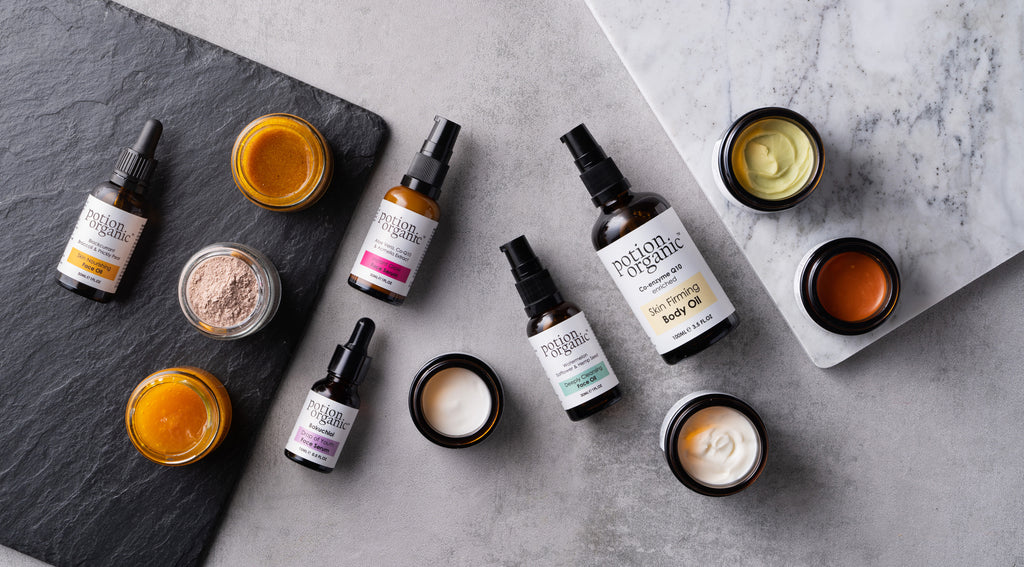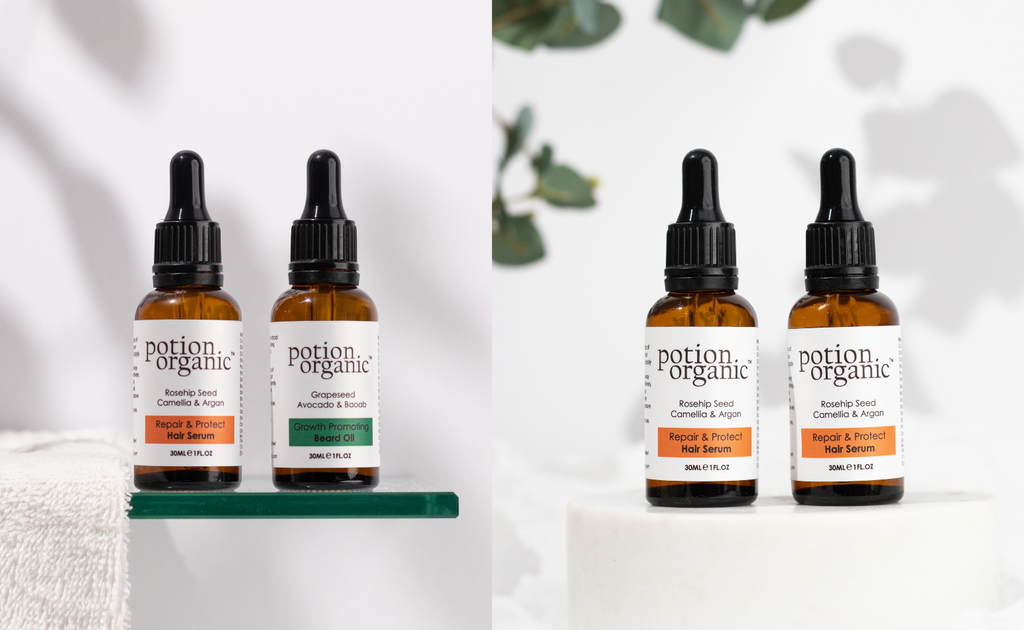Miraculous Powers of Argan Oil - The Key Benefits of Using Argan Oil For Skin & Hair
Argan Oil: A Miracle for Skin Health
The History of Argan Oil
The story of Argan oil dates back to ancient times when the Berber tribes of Morocco discovered the miraculous benefits of this golden elixir.
Traditionally, the Berbers meticulously handpicked the Argan fruits, extracted the kernels, and ground them into a nutritious paste. This paste was then pressed to extract the oil, a process that was labor-intensive but preserved the purity and potency of the oil.
Recognized for its therapeutic properties, Argan oil was utilized not only in skincare routines but also in traditional Moroccan medicine and cuisine.
The Argan tree, the source of this incredible oil, is so significant in Moroccan culture and ecology that in 1998, UNESCO declared the Argan tree forest in Morocco a biosphere reserve. Today, the legacy of Argan oil continues, a testament to its timeless appeal and unparalleled skincare benefits.

Why it's Referred to as 'Liquid Gold'
Argan oil has earned the moniker 'liquid gold' for a variety of compelling reasons. Not only does its golden hue resemble the precious metal, but its value in skincare is equally inestimable.
Argan oil is a rich source of essential nutrients including vitamin E, omega fatty acids, and linoleic acids - all of which are known to moisturize skin, reduce inflammation, and combat oxidative damage. Moreover, its rarity further adds to its 'golden' status.
The Argan tree, from which the oil is derived, grows in a very limited area in Morocco, making the oil one of the rarest in the world. This rarity, combined with the labor-intensive extraction process, results in a product that is as precious as it is beneficial.
Therefore, the term 'liquid gold' not only describes its color and aesthetic appeal but also aptly symbolizes the invaluable role Argan oil plays in nurturing and enhancing skin health.
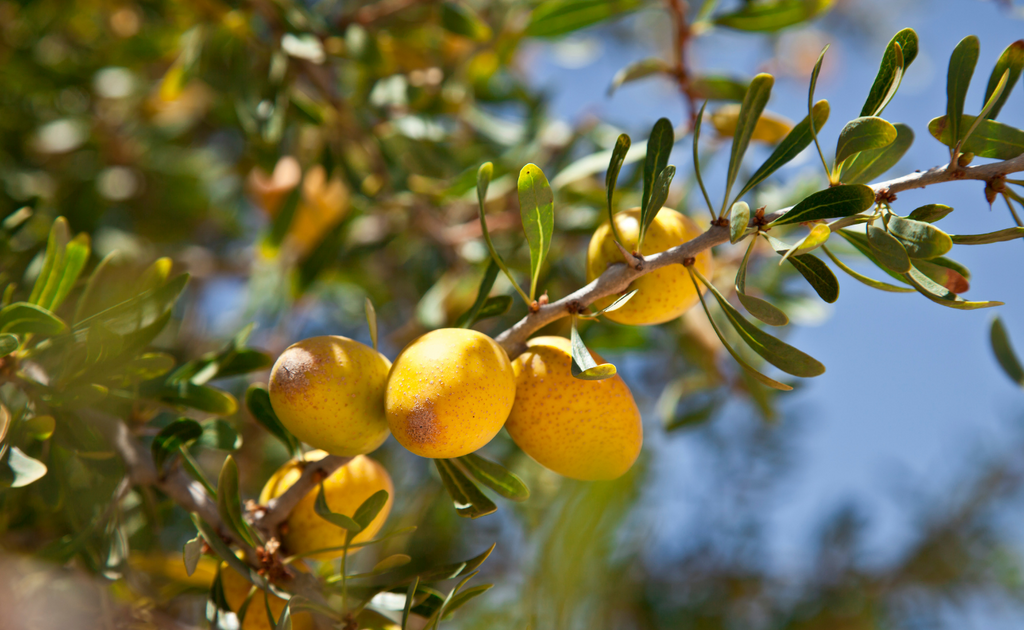
The Argan Tree and Its Unique Existence
The Argan tree, known scientifically as Argania Spinosa, is native to and primarily found in the semi-desert region of southwestern Morocco.
This hardy tree has adapted to thrive in the harsh conditions of this region, characterized by intense heat, poor soil quality, and minimal rainfall. The Argan tree's resilience and longevity, with some trees reported to be more than 200 years old, is a testament to its remarkable ability to survive in this arid climate.
Additionally, some Argan trees can also be found in a few regions of Algeria. However, the Argan forest in Morocco remains the primary and most notable habitat of these extraordinary trees.
The Process of Extracting Oil from the Argan Tree
The extraction of Argan oil is an intricate and labor-intensive process, steeped in tradition and requiring a delicate touch. It begins with the harvesting of the Argan fruits during the months of July and August.
The flesh of the harvested fruit is then removed to reveal a hard nut, which contains one to three oil-rich kernels. These nuts are sun-dried and then cracked open manually with stones—a skill requiring precision to avoid damaging the precious kernels within.
Once the kernels are extracted, they are ground into a paste using a stone quern. This paste is then hand-kneaded for hours, often with the addition of water, to extract the oil.
This traditional method of extraction, though time-consuming, preserves the oil's quality and nutritional value. In more recent times, mechanical presses have started to be used for oil extraction, a process that is more efficient but can potentially compromise the oil's purity.
Regardless of the method, the result is a precious 'liquid gold'—Argan oil, ready to work its magic in rejuvenating and revitalizing skin health.

Nutrient Composition of Argan Oil
Essential Nutrients Found in Argan Oil
Argan oil is a treasure trove of nutrients that are vital for maintaining skin health. It is rich in Vitamin E, also known as tocopherol, a powerful antioxidant that protects the skin from harmful free radicals and environmental damage. This vitamin also has moisturizing properties, helping to keep the skin hydrated and soft.
The oil is also packed with Omega fatty acids, including omega 6 and omega 9. These essential fats play a key role in maintaining the integrity of the skin's barrier function, locking in moisture and keeping pollutants out. They also possess anti-inflammatory properties, helping to soothe and calm irritated skin.
Argan oil contains an abundance of Linoleic acids, which are known for their ability to lighten dark spots and improve overall skin tone. In addition, they can help reduce acne by controlling the overproduction of sebum, the skin's natural oil.
The presence of Polyphenols in Argan oil contributes to its anti-aging properties. These plant-based compounds have potent antioxidant and anti-inflammatory effects, which can combat signs of aging such as wrinkles and fine lines.
The oil also includes Squalene, a naturally occurring compound that mimics our skin's natural oils, making it an excellent moisturizer. Squalene also boasts antioxidant properties, which can protect the skin from UV damage and premature aging.
Overall, the remarkable nutrient profile of Argan oil makes it a versatile elixir for all skin types, addressing a range of skin concerns from dryness and inflammation to acne and aging.
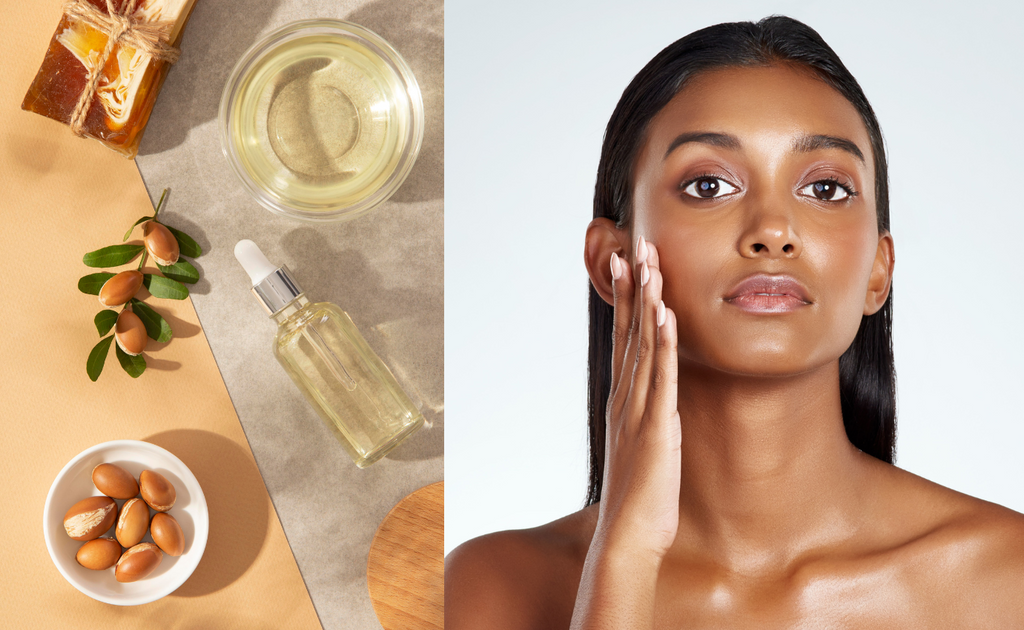
Antioxidants in Argan Oil and Their Benefits
Argan oil is revered for its high antioxidant content, a characteristic that significantly enhances its curative properties. Antioxidants play a crucial role in protecting our skin from the harmful effects of oxidative stress caused by free radicals, elements that can damage the skin at a cellular level leading to premature aging.
One of the primary antioxidants found in Argan oil is Vitamin E or Tocopherol. This powerful antioxidant helps neutralize free radicals, thereby reducing the damage they can cause. Vitamin E also aids in repairing and improving the overall health of the skin.
Polyphenols, another type of antioxidant found in Argan oil, contribute to its anti-aging benefits. These plant-based compounds work not only to neutralize free radicals but also to reduce inflammation, a significant contributor to the aging process. Polyphenols assist in maintaining the skin's elasticity and firmness, helping to reduce the appearance of wrinkles and fine lines.
Finally, Squalene, a naturally occurring antioxidant in Argan oil, mimics our skin’s natural oils, making it an excellent moisturizer. Its antioxidant property protects the skin from UV damage and premature aging.
In summary, the antioxidants in Argan oil serve as a protective barrier for the skin, combating environmental damage, reducing inflammation and signs of aging, and promoting a healthy, youthful complexion. Their presence in this 'liquid gold' underscores the value of Argan oil in skincare.
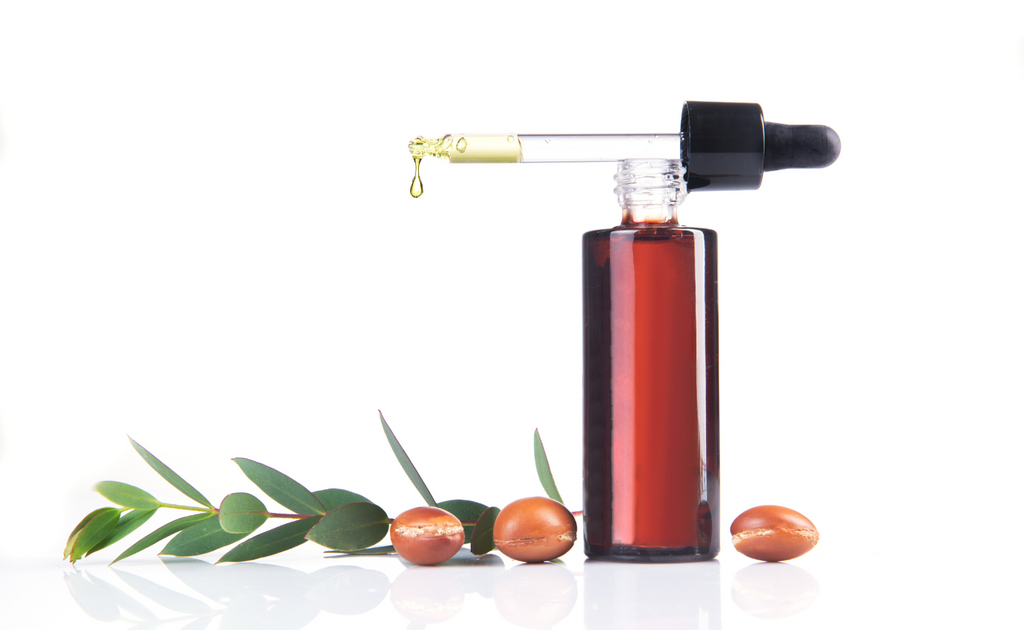
Anti-Inflammatory Compounds in Argan Oil and Their Effects
Argan oil is not only celebrated for its antioxidant properties; it also boasts potent anti-inflammatory compounds that soothe the skin and reduce inflammation. One such compound is Omega-6 fatty acid, also known as linoleic acid.
This essential nutrient is known to alleviate inflammation and soothe redness and swelling caused by conditions like acne and dermatitis. By regulating the body’s production of pro-inflammatory compounds, linoleic acid helps maintain the skin’s health and suppleness.
Another significant compound is butyrospermol, a rare plant sterol with anti-inflammatory properties. Butyrospermol targets pathways in the body’s inflammatory response, reducing the production of inflammatory cells and cytokines that contribute to skin inflammation.
These anti-inflammatory compounds in Argan oil work synergistically to soothe irritated skin, reduce inflammation, and promote a healthy and vibrant complexion. Their presence further validates Argan oil as a versatile and valuable addition to any skincare regimen.
Benefits of Argan Oil for Skin
Argan oil has a multitude of benefits for the skin, thanks to its rich nutrient profile. Its hydrating properties, courtesy of Vitamin E and squalene, keep the skin moisturized and supple, making it an excellent remedy for dry and flaky skin.
The Omega fatty acids and linoleic acids present in Argan oil not only nourish the skin but also help maintain a strong skin barrier, locking in moisture and keeping pollutants at bay. These elements, combined with potent antioxidants, protect the skin from environmental damage and oxidative stress, helping to stave off signs of aging such as wrinkles and fine lines.
The anti-inflammatory compounds, notably Omega-6 fatty acid and butyrospermol, work to soothe irritated skin and reduce inflammation. Additionally, linoleic acids contribute to acne control by regulating sebum production.
Whether it's combating dryness, managing acne, or reducing signs of aging, Argan oil is a versatile addition to any skincare routine, catering to a variety of skin types and concerns.
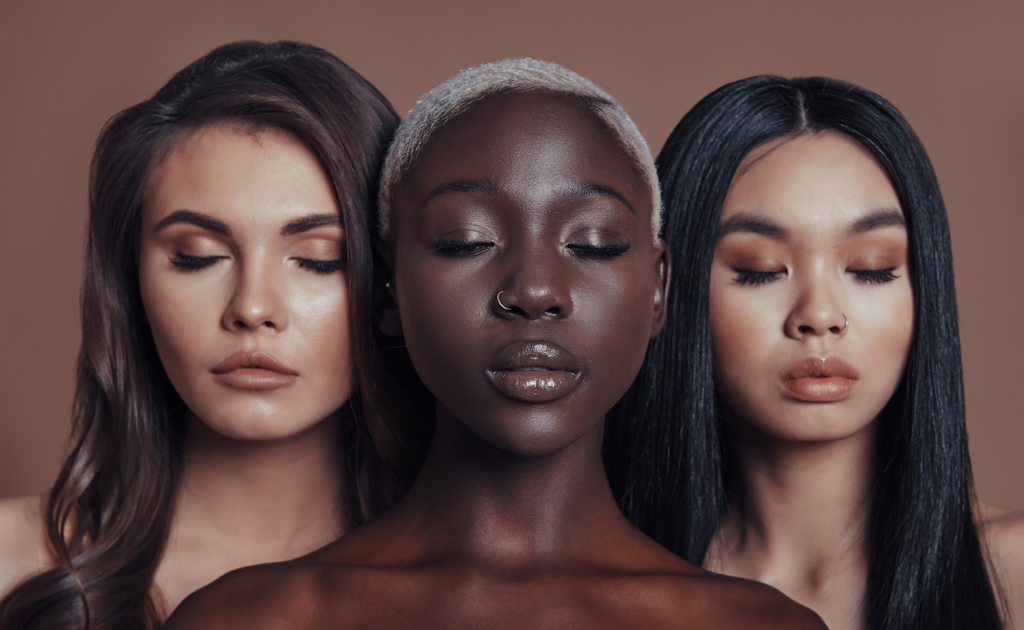
Top 5 Skin Benefits of Argan Oil
- Hydration: Argan oil acts as an excellent moisturizer due to its high Vitamin E and squalene content. These elements help retain the natural moisture of the skin, prevent water loss, and keep the skin soft and hydrated. This effect is particularly beneficial for dry and flaky skin, providing relief and promoting smooth, supple skin.
- Skin Barrier Protection: The Omega fatty acids in Argan oil play a crucial role in maintaining the skin's barrier function. As part of this function, these fatty acids help lock in moisture and keep environmental pollutants at bay, thereby ensuring the skin's overall health and resilience.
- Anti-Aging: Argan oil is rich in antioxidants such as Vitamin E, polyphenols, and squalene. These compounds neutralize harmful free radicals, reduce oxidative stress and inflammation, and protect the skin against environmental damage. By doing so, they help prevent early signs of aging like wrinkles and fine lines, ensuring skin retains its elasticity and firmness.
- Anti-Inflammation: Omega-6 fatty acid, also known as linoleic acid, and the rare plant sterol butyrospermol in Argan oil have potent anti-inflammatory properties. These compounds soothe irritated skin, alleviate redness and swelling, and reduce inflammation related to conditions like acne and dermatitis, promoting overall skin health.
- Acne Control: Linoleic acids in Argan oil regulate sebum production, the overproduction of which can cause acne. By controlling sebum production, Argan oil helps prevent acne outbreaks and contributes to clearer and healthier skin.
In conclusion, Argan oil offers a multitude of benefits, addressing a range of skin concerns from dryness and inflammation to aging and acne. It is a versatile, all-in-one skincare solution suitable for various skin types.

How to Use Argan Oil for Skin Health
Incorporating Argan oil into your daily skincare routine is simple and versatile. Here are a few ways to reap its benefits:
- As a Moisturizer: After cleansing your face in the morning or at night, take a few drops of Argan oil and gently massage it into your skin. Its fast-absorbing property leaves your skin soft, supple, and hydrated without feeling greasy.
- As a Night Serum: Due to its anti-aging properties, Argan oil makes for an excellent night serum. Apply a few drops before bedtime and let it work its magic overnight, allowing you to wake up to a revitalized and youthful complexion.
- As an Acne Treatment: Mix a few drops of Argan oil with tea tree oil, and apply it to the affected area. The anti-inflammatory properties of both oils work together to reduce inflammation and soothe the skin.
- For Dry Skin: If you have dry patches on your body, apply Argan oil directly to these areas for instant relief. It can also be used as a lip moisturizer to treat dry, chapped lips.
- As a Makeup Base: Apply a few drops of Argan oil before your makeup routine. It helps to smooth the skin, making it a perfect base for makeup.
Remember to perform a patch test before using Argan oil to check for any allergic reactions. It's also important to ensure you're using pure, organic Argan oil to get the maximum benefits.

Argan oil skin benefits for all skin types:
For oily skin, Argan oil can be a game-changer. Despite the common preconception, using oil on oily skin can actually help regulate oil production.
Argan oil's high concentration of linoleic acid can help reduce inflammation caused by acne, rashes, infections and more. Additionally, it helps to balance the skin by providing natural moisture.
Moreover, the oil's non-greasy nature means it doesn't clog pores. Instead, it promotes healthier skin by providing necessary nutrients and antioxidants without greasy residue. Regular use of Argan oil can lead to a balanced and clearer complexion with a natural, healthy glow.
For dry skin , Argan oil is a no-brainer. Its nourishing and moisturizing properties make it an ideal solution for dry skin. Thanks to its high concentrations of fatty acids and Vitamin E, Argan oil helps replenish the lost moisture in dry skin, leaving it soft and smooth. The antioxidants present in Argan oil further help protect the skin from environmental pollutants. With regular use, the skin's natural oil balance will be restored and its texture improved.
For combination skin , Argan oil can be a great solution to tackle the different needs of oily and dry areas. The unique composition of fatty acids helps regulate sebum production, while providing enough moisture for dry patches. It also helps relieve inflammation caused by acne and other skin conditions. With regular use, combination skin will be well-balanced and nourished.
Overall, Argan oil can be a great addition to any skincare routine! Its abundance of beneficial properties make it an essential element for healthy and glowing skin. So if you haven't already, give this 'liquid gold' a try - your skin will thank you for it!
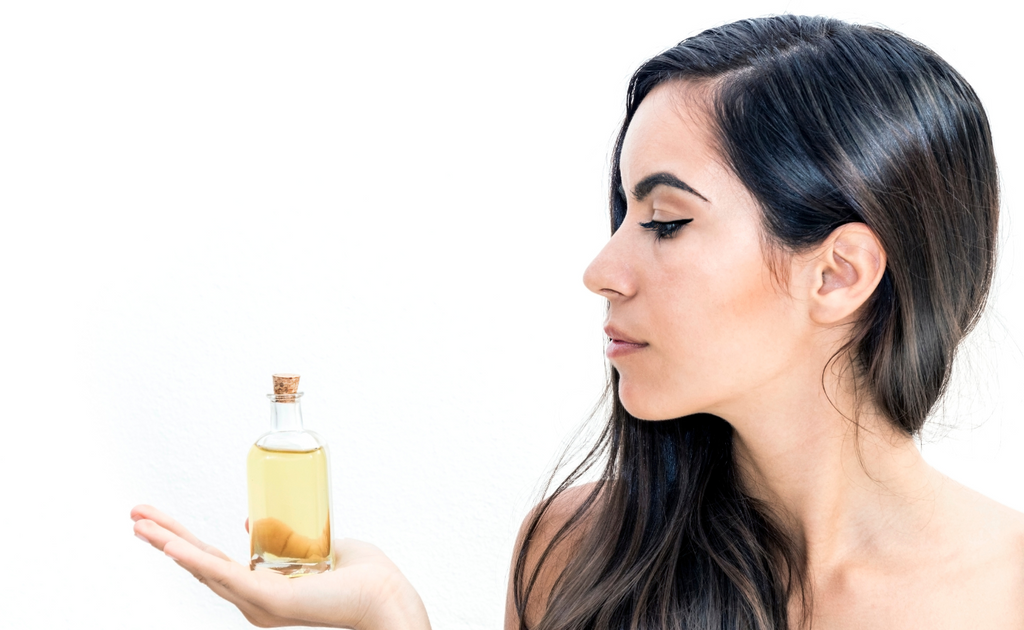
Benefits of Argan Oil for Hair
Argan oil has been hailed as a potent elixir not just for skin care, but also for hair care. Its unique composition of essential nutrients, antioxidants and hydrating compounds make it an excellent treatment for a variety of hair needs and concerns.
- Moisturizing: Like the skin, your hair also needs adequate hydration to stay healthy. Argan oil, with its high Vitamin E and fatty acids content, helps to moisturize the hair and scalp, combating dryness and frizziness.
- Scalp Health: Argan oil's anti-inflammatory properties, courtesy of butyrospermol and linoleic acid, soothe the scalp, reducing itchiness and dandruff.
- Hair Growth: The antioxidants in Argan oil promote healthy hair growth by combating oxidative stress and damage that can impede hair growth and cause hair loss.
- Hair Shine and Softness: Regular use of Argan oil can improve hair's texture, making it softer, silkier, and shinier.
- Heat Protection: When used as a pre-styling treatment, Argan oil can provide a protective layer against heat damage from styling tools.
Incorporating Argan oil in your hair care routine can therefore nourish, protect, and enhance the health of your hair, making it a versatile addition to any beauty regimen.
Argan oil, or 'liquid gold', as it is often referred to, has proven to be a powerful ally for both skin and hair health. Its myriad of benefits make it an integral part of skincare and hair care routines.
For the skin, it hydrates, protects against environmental pollutants, fights signs of aging, soothes inflammation, and aids in acne control.
Moreover, it's a versatile solution, catering to various skin types and concerns. When it comes to hair, Argan oil's moisturizing, scalp-soothing, growth-promoting, texture-enhancing, and heat-protective properties make it a valuable addition to any hair care regimen.
Its combination of essential nutrients, antioxidants, and anti-inflammatory compounds offer a holistic approach to beauty, earning Argan oil a well-deserved place in the spotlight of the beauty world.
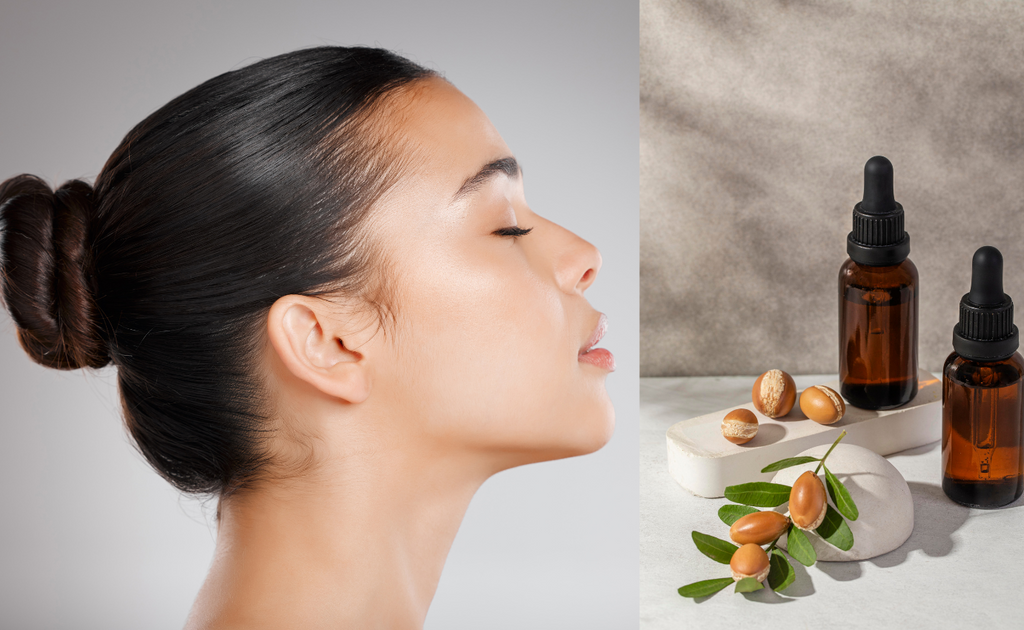
Pure argan oil is effective in wound healing and treating stretch marks, improves skin elasticity health benefits.
Argan oil benefits is beneficial for healthy skin, dry hair and damaged hair, it prevents hair breakage
Pure argan oil is a truly unique and versatile ingredient, with applications ranging from cosmetics to cuisine.
Cosmetic argan oil has been a time-honored secret of Moroccan skincare routines, culinary argan oil is equally as appreciated for its nutty, buttery flavor and health benefits.
Rich in essential fatty acids, Vitamin E, and phenols, argan oil has been shown to help reduce inflammation and regulate cholesterol levels. It also works as a natural antioxidant, helping to protect the body from damage caused by free radicals.
This amazing ingredient can be used not only in salads along with olive oil is one of the healthiest oils options.
Argan Oil in Potion Organic Skincare
Argan Oil can be found in many of the Potion Organic Products. This luxurious oil is renowned for its nourishing and strengthening properties, making it an excellent ingredient for hair and skincare products.
It is the star ingredient in our award-winning Marine Collagen Cream, thanks to its remarkable anti-aging properties. The combination of Argan Oil and Marine Collagen deeply hydrates the skin, reducing wrinkles, dark spots, and fine lines, making it an ideal choice for maintaining a youthful complexion.
Drop of Youth Oily Serum also incorporates Argan Oil for its skin-restoring and collagen-boosting abilities. Not only does it nourish the skin, but it also soothes irritation and reduces redness, making it suitable for sensitive skin types.
Potion Organic Skin Firming Body Oil contains Argan Oil known for its healing properties for wounds and stretch marks, along with Q10 and other essential oils. This lightweight oil tightens the skin, diminishes the appearance of scars, and improves elasticity for a smoother, firmer complexion.
Last but not least, our haircare range, Repair & Protect Organic Hair Oil & Grooming & Moisturising Organic Beard Oil, both enriched with organic argan oil, helps improve the health and texture of your hair.
Whether you're seeking to heal damaged skin, maintain a youthful complexion, or restore healthy hair, argan oil is an exceptional addition to your daily routine.

